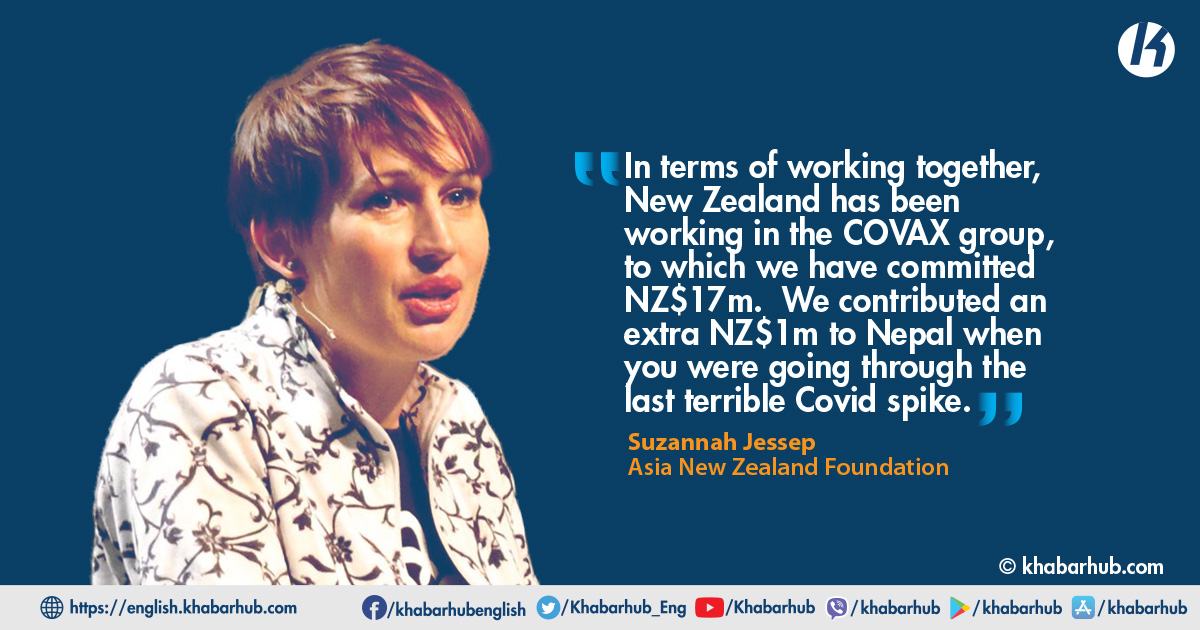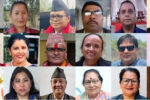Suzannah Jessep joined the Asia New Zealand Foundation in March 2019, after serving as New Zealand’s Deputy High Commissioner to India, Sri Lanka, Bangladesh and Deputy Ambassador to Nepal and as New Zealand’s Deputy High Commissioner to Vanuatu.
During her thirteen years in the Ministry of Foreign Affairs and Trade, she also served in the Ministry’s Australia, Pacific, and Europe Divisions, and in the area of Antarctic and security policy.
She is a Board member of the New Zealand Institute of International Affairs (NZIIA) and sits on the Advisory Boards of Minister Damien O’Connor’s Trade for All Ministerial Advisory Group, the New Zealand Contemporary China Research Centre (NZCCRC) and the New Zealand India Research Institute (NZIRI). Suzannah is passionate about Asia, and in particular building New Zealand’s connections with the fast-growing and dynamic South Asia.
Dr. Pramod Jaiswal, Strategic Affairs Editor at Khabarhub, spoke to Suzannah Jessep on “New Zealand- South Asia Ties”
Ms. Jessep, the first question for today is what are New Zealand’s Foreign Policy priorities? How do you look at New Zealand’s Foreign Policy?
Well, on New Zealand’s foreign policy, New Zealand has typically prided itself on being an engaged player, guided by the principle that if you’re not at the table you are still on the menu.
So, in normal times, not in the midst of a pandemic, you could expect to see us exhibit classic small state behavior: active multilateralism, working with others balancing powers and interests, using soft power and so on.
But with COVID-19, much of this has been thrown upside down. I think it’s fair to say we are now far more insular and introspective and we have become more focused on our immediate neighborhood, particularly the South Pacific and here our priority is just to be a good partner, in bilateral terms, keep trade ticking over, support development – we have got a development program of around USD 1.3 billion over three years, and through offering assistance help support with COVID-19.
I guess the other factor that shapes New Zealand’s foreign policy is our status as a maritime nation. We have got the fourth largest EEZ globally, no land borders, all our trade goes by sea and so we are very attentive of the rules and laws that govern the sea such as UNCLOS.
The third factor that shapes our foreign policy is New Zealand’s current leadership, which brings quite a different flavor to New Zealand’s foreign policy compared to what we were seeing in the past.
Prime Minister Ardern is a young female leader whose got a very different style of politics compared to her predecessors and much of her communication to the New Zealand general public has been around kindness, equity and community wellbeing, which has been quite different from John Key and his trade-driven approach and certainly contrasts in a tone quite a bit to, say, Australia’s Scott Morrison.
It’s the same for Nanaia Mahuta, our foreign minister, who has brought a real focus on Maori values and bringing an indigenous lens to foreign policy which I think your institute has recently explored; but the degree to which these things change the direction of New Zealand’s foreign policy, I’m not so sure. I think it’s more a matter of style and tone rather than any significant policy shift.
In day to day terms, right now, New Zealand’s foreign policy is focused on combating covid, we have got quite an aggressive elimination strategy with short, sharp lockdowns, pretty much-closed borders and now we are working on just getting our vaccination rates up and then on rebuilding and reconnecting.
We are also hosting APEC this year, which is being organized online unfortunately but it’s involved a tremendous amount of energy from our foreign ministry.
And I don’t think New Zealand is under any delusions that APEC is a perfect body but we do see it as an investment in the public body and as a body that helps grow the pieces that form the new formal architecture of the Asia Pacific.
Overall, I would say that geography is destiny and when under stress countries revert their instincts, that New Zealand has reverted towards, which is to be an island among islands and I don’t think this is a particularly good thing but this is the reality of New Zealand’s foreign policy right now.
What is your view on the rise of emerging Asia, and how does New Zealand perceive it?
New Zealand’s definitely been in the camp of welcoming the rise of Asia, the Asia-New Zealand foundation where I work, we were established in 1994 specifically because we recognized the importance of Asia and the need to invest more, learning about Asia and working together.
More recently, however, in the last ten years or so, we have become more cautious about the rise of superpowers within Asia, particularly China, because experiences have taught us that our values don’t wholly align and because of the impact those superpowers can have on the roles and regional order, that small and dependent countries like Nepal and New Zealand depend on.
It’s made New Zealand wearier and more selective but I think that’s true for most countries at the moment because we are still learning to compete and cooperate simultaneously.
Government relations aside, I think public perception has also played a role here; for the last 25 years we have run a longitudinal study of New Zealander’s perceptions of Asia, and our latest study which was released in June, we found that while a greater number of New Zealanders consider Asia to be important now than at any other time in the previous 25 years, this is despite the pandemic playing out.
The perception of China’s friendliness towards New Zealand has notably deteriorated with a 14% drop between 2019 and 2020 to the extent that for the first time ever, more new Zealanders said that they saw China as a threat more than a friend; and this is reflective of key reasons of basically not liking what they see- wolf-warrior diplomacy and things like state-sponsored cyber-attacks affecting the services they use and concerns about human rights violation and more recently hostage diplomacy, incursions in the sovereign territory and so on.
At the same time, the survey asked New Zealanders, which countries in Asia should New Zealand spend more time and energy to manage and sticking on the list was China, which was somewhat a bit of an odd case because we know that the China relationship is going to be difficult and hard to manage but we still want to engage.
More broadly, we saw a marked increase in the friendliness of many, the perceptions of many south and southeast Asian countries, particularly Vietnam and India.
So, there is some rebalancing and reorientation going on in regards to perceptions about the rise of Asia but overall, I think it’s fair to say we remain very connected and this has got to be a good thing for New Zealand; seven out of our top ten trading partners are in Asia, one in six New Zealanders are of Asian heritage and so on, so I think we are integrated into rising Asia and this is supported by statistics such as these.

Asia-Pacific has long been the focus of New Zealand diplomacy, strategy and trade. How does New Zealand see South Asia in terms of pursuing its engagement with the region? Does New Zealand recognize the importance of South Asia as an economic partner and its growing political significance?
This is a really interesting question and something that I have actively engaged in. My own view is that New Zealand doesn’t know enough about South Asia, it’s been too far off the radar; we have risked a lot of our engagement on positive, easy connections borne out of our sheer commonwealth heritage and long-standing people connections as we have discussed with Tenzing Norgay and Edmund Hillary that is again being carried forward by others.
But I don’t think we have really figured out how to be an effective small partner, when trade isn’t at the heart of our engagement, because for New Zealand one thing has always been true that trade has been at the heart of our foreign policy in building connections and often it’s been that we have agreed to trade deals and once it’s been achieved, the other doors are open for other investments and initiatives and this has worked well across Asia for us, it’s been successful.
But trade isn’t at the heart of what’s been achieved in South Asia. Our relationship has been warm and long-standing at least in my view, and because of this and if we can call it that, I think media headlines disproportionately shape the public’s impression and because of the way the media has been operating, it typically hasn’t been favorable to the region.
We see disasters and extreme events but we are not really hearing about the innovations and the positive developments and the other things that really bring us together.
Nevertheless, I think this is changing, as is the trading world itself, there’s this strong sense in New Zealand that the time of big, high ambitious trade deals might be waning and the ease of doing business and the ease of doing diplomacy is becoming much harder, and the pandemic obviously has had a massive impact here.
But it also just reflects today’s geopolitics and in New Zealand’s case, this has meant we have moved towards more bespoke initiatives that might not achieve everything we want in the trade sense but that might weave in environmental standards, gender and equity standards or maintain the supply of essential goods during COVID-19 and so on.
So, ultimately, even if our trade relationships are put aside, whatever form these trade relations take, there is no question that South Asia matters to New Zealand.
And we know South Asia is going to be consequential, I just don’t think we have quite landed on how great it looks yet, but this is something that my foundation and I, in particular, are working to explore right now.
After serving for years as New Zealand’s Deputy High Commissioner to India, Sri Lanka, Bangladesh and as the Deputy Ambassador to Nepal, how do you see New Zealand’s engagement in South Asia?
I mean there is no shortage of goodwill, but we are limited by our size and resourcing, so I think we are always having to think creatively and strategically about how we can build the right kind of relations and with COVID-19 and closed borders, there is no question that it’s been harder to sustain relations.
But when we look at the world today and at global dynamics, I think we have got a lot to discuss and countries such as Nepal and New Zealand have strong vested interests in maintaining a rule-based global order.
We’ve both got interests in peace and stability and resolving disputes peacefully. We both have equities in the WTO and multilateral organizations.
We both want to ensure that countries respect the sovereignty of others, we both want to ensure that middle powers have a say and it’s not just a “might is right” world. And I think we each have a real interest in developing our people and economies so that they are equipped to operate in a world that is certain, is stable and is predictable.
So, I think there is no question that we have shared interests but the main question is how do we do this effectively today. And I know New Zealand will be very interested in South Asia and Nepal, in particular.
As the former Deputy Ambassador to Nepal, how do you assess Nepal-New Zealand relations throughout the years?
I think it’s strongly people-based and really shaped by the achievements of specific individuals such as Tensing Norgay and Ed Hillary, and the subsequent formation of organizations such as the Himalayan trust and the various initiatives led by its members and supporters.
Here, in New Zealand, we have the achievements of our Nepali diaspora, like those who lead the New Zealand-Nepal Society and many of these connections have created positive legacies in various fields. We have also got our students who have gone on to do great things in both countries.
But while we don’t have reciprocal high commissions, we do have wonderful honorary consuls, who have helped to retain that real sense of goodwill and trust between us. So, we enjoy warm relations, but we could be doing a lot more.
In what ways can New Zealand and Nepal work together in promoting the economic ties between the two countries?
At the moment, I think the COVID-19 is dominating everything. New Zealand has closed borders and much of our energy is just responding, keeping people employed, and keeping supply chains functional. But as we recover, I think there’s no question that New Zealand will be looking to South Asia to continue to grow and to diversify its economic relationships, including with countries like Nepal, in areas such as tourism.
I know it’s the area we have worked together in the past, and given the service sector has been hit so hard, it seems like a good area for us to work together again – to really look at regrowing and sharing expertise around ecotourism and adventure tourism and sharing on best practices and sustainable practices.
What would be your suggestions to Nepali students planning to study in New Zealand?
Well, I don’t like to say this but my advice would be to wait. I would wish we had students coming now but unfortunately, it’s a little too early to contemplate studying in New Zealand because of the elimination strategy we have and related to this, our almost-hermetically sealed borders.
Even New Zealand citizens are struggling to return. I think there are something like thirty-one thousand New Zealanders on the list waiting to get access to managed quarantine facilities.
So, it’s quite intense at the moment. On the flip side, it also means we have only had four thousand COVID-19 cases and fewer than 30 deaths.
But we haven’t quite figured out the system yet for how to get students back, how to ensure that they are looked after safely, and how to house everyone safely.
So, it’s a little slow going. But I know Universities themselves are already exploring options and looking at hybrid postgraduate high degrees with the final years done in New Zealand, but of course this only works for some disciplines. So, for now, let’s wait, but I hope to bring better news in the coming months.
How is New Zealand coping with the COVID-19 pandemic? How can New Zealand support Nepal in the fight against the pandemic?
Yes, New Zealand is doing pretty well. But it is on the basis of having a very smooth population. I think we have got a ridiculously high level of trust in the government.
So, meaning that we follow the advice and we are very compliant and there haven’t been any protests here. And the government also has been taking on debt to keep businesses afloat and jobs going on.
But because we have kept the virus numbers low, our economy is also doing quite well, I believe it’s growing at 2.8 percent.
And in fact, recently I saw a global rating agency singled out New Zealand as one of the better performing economies in the Asia Pacific.
And I think only one or two, that are growing faster alongside Singapore. But certainly, the challenge for us is now that we need to start opening up, and the community is divided around whether we should be doing this. Some want us to achieve a very high vaccination rate before we do.
And others want the doors open tomorrow. So, the vaccinations are happening but I think we are at around 35-40 percent of the population who are eligible. Only a little way behind Nepal, which I believe is sitting at 20% vaccination rates. So, we both still have a way to go there.
In terms of working together, New Zealand has been working in the COVAX group, to which we have committed NZ$17m.
We contributed an extra NZ$1m to Nepal when you were going through the last terrible Covid spike. We have been working with other governments: sharing information and some of our communications and graphics, which I believe the WHO is also using.
There’s been quite a bit of collaboration within the region, with Taiwan and Singapore and Vietnam and others; who have shared their expertise and data, but I think fundamentally Delta seems like a bit of a game-changer in terms of transmission. So, now, it’s really all about vaccination rates and helping each other get as high rates as possible.
And looking at it, I think New Zealand will be very interested in how Nepal is going as it facilitates tourists’ new arrivals at the moment.
And we would very greatly learn from the experiences Nepal takes from it. And likewise, I am sure New Zealand would be very happy to share any experiences or insights it has.
What does the fall of Afghanistan mean to New Zealand?
We are a long way away from Afghanistan. But there’s no doubt, it has been distressing. I don’t think there’s any country that wants to see its efforts evaporate quickly.
And the speed at which the Taliban took over, and the messages coming from the Taliban – particularly related to the rights of Afghanistan’s women and children – was pretty alarming for New Zealand.
The New Zealand defense force was able to get hundreds of our people out, but also hundreds remain. So, like others, we are now looking at what we can do to work with others to get those people out.
In terms of our government, we do worry about the situation in Afghanistan and Taliban rule and what it means for regional security, for stability, for war on terror, for the rights of Afghanistan’s citizens, who would have otherwise shaped Afghanistan’s future. So, overall what I would have to say is probably a big step back on almost every front.
China is one of the emerging powers in South Asia. Balancing China is one of the major challenges of almost all South Asian countries. How is New Zealand engaging with China?
I would describe New Zealand as being in the same predicament as most others. We have a very strong trade relationship but certainly, there are aspects of CCP [Chinese Communist Party] behavior that worries us deeply from a security and regional order perspective.
New Zealand’s approach has been to try to keep relations functional. We have spoken up when we see CCP do something that we don’t support or endorse.
But we try to keep the other parts of the relationship intact and the Ardern government aims to be consistent so that we are predictable.
And this seems to be premised on the idea that we try to not be the ones that rock the boat, that we try to manage our issues together in good faith.
But, I would say it’s done on full knowledge that ultimately it might not be our choice, when or if the relationship deteriorates.
Others are saying that it’s often the CCP who decides unilaterally when it wants to show its displeasure with a country as we saw with Australia.
In talking to Australian colleagues, they highlighted that ultimately the deterioration in their relationship came down to values, which is not something that is easy to reconcile if they are fundamentally different.
So, there is no simple “patch up to get back to business.” These are the differences that are quite deep-seated, so we are a little wary.
But, we are trying to manage the relationship without the heat. But I don’t think we are in an illusion that it might not be our turn next.
The last thing to say is that if things do deteriorate, we don’t have any hard power to project so whatever happens, we are going to have to manage the situation through diplomacy and partnering with others.








Comment